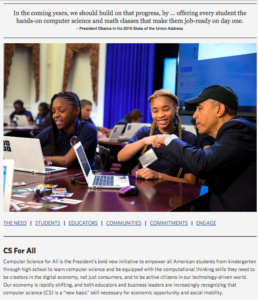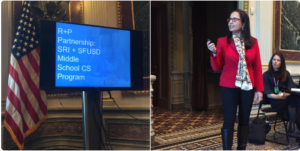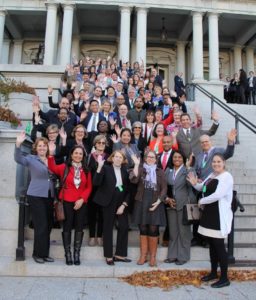 January 30, 2016 was a watershed moment in the nation’s quest to create a citizenry that is prepared to compete and innovate in a world increasingly steered by computing. President Obama launched the bold CSForAll initiative, and in doing so brought to fruition almost a decade long effort to bring K-12 to schools. The “ForAll” piece is intentional and important in order to address the gross inequities in the male-dominated STEM culture, in general, and the CS/tech sector, in particular. It is meant to ensure that the nation does this right by keeping issues of access and inequity front and center in this movement, that groups historically underrepresented in CS and computing-related jobs are not left behind.
January 30, 2016 was a watershed moment in the nation’s quest to create a citizenry that is prepared to compete and innovate in a world increasingly steered by computing. President Obama launched the bold CSForAll initiative, and in doing so brought to fruition almost a decade long effort to bring K-12 to schools. The “ForAll” piece is intentional and important in order to address the gross inequities in the male-dominated STEM culture, in general, and the CS/tech sector, in particular. It is meant to ensure that the nation does this right by keeping issues of access and inequity front and center in this movement, that groups historically underrepresented in CS and computing-related jobs are not left behind.
The reverberations of the call for CSForAll are being felt in districts, states, and districts nation-wide. Past NSF-funded efforts such as ECEP that were launched almost a decade ago to support state-wide initiatives and community building around taking CS to schools have received a shot in the arm as they grow at an unprecedented pace. New NSF-funded programs such as Computer Science for All:Researcher Practitioner Partnerships (CS for All: RPP) aim to take this to the next level.
The White House OSTP in partnership with the NSF has taken an active role in hosting several summits and meetings since the January announcement to bring together various stakeholders from around the country under one roof to help create the networks to build and sustain CSForAll (huge shout out to Ruthe Farmer). The White House Summit on State Implementation of CSForAll – hosted by the White House OSTP on October 28, 2016 – served as a precursor to NSF CS For All: RPP solicitation. It brought together about 100 state teams from 17 states in the ECEP network comprising educators, state level policy makers, non-profit. I had the good fortune to be invited to this summit.
 In an effort to ensure that classroom implementation and roll-out of CS is mindful and supported by research-practice partnerships, the R+P Collaboratory (also funded by the NSF) was invited to facilitate sessions that would provide ECEP teams with ideas on how design-based implementation research and ideas from the learning sciences could guide meaningful, evidence-driven implementation of CSForAll. I participated in an RPC panel titled ‘Finding the Sweet Spot’ in my capacity as a learning scientist actively engaged in CS education research. I provided a brief glimpse into our work on an NSF-funded STEM+Computing CS Education research project around innovative curricular designs for reaching diverse learners, robust assessment design to support CS implementations, and most importantly, our partnership with SFUSD to evaluate their middle school CS program.
In an effort to ensure that classroom implementation and roll-out of CS is mindful and supported by research-practice partnerships, the R+P Collaboratory (also funded by the NSF) was invited to facilitate sessions that would provide ECEP teams with ideas on how design-based implementation research and ideas from the learning sciences could guide meaningful, evidence-driven implementation of CSForAll. I participated in an RPC panel titled ‘Finding the Sweet Spot’ in my capacity as a learning scientist actively engaged in CS education research. I provided a brief glimpse into our work on an NSF-funded STEM+Computing CS Education research project around innovative curricular designs for reaching diverse learners, robust assessment design to support CS implementations, and most importantly, our partnership with SFUSD to evaluate their middle school CS program.




